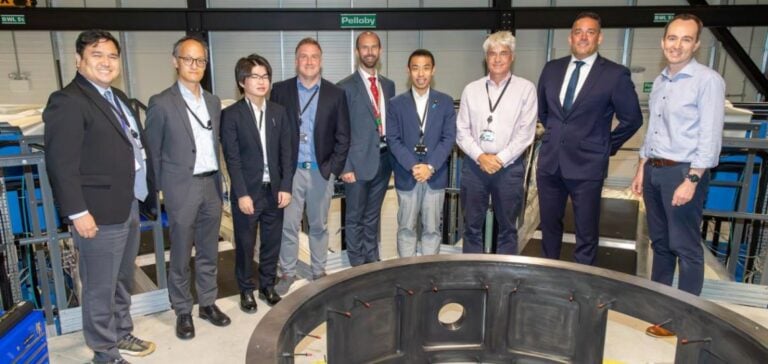The UK and Japan deepen their partnership to accelerate the development of commercial fusion energy.
First Light Fusion, a UK company specializing in inertial confinement fusion, welcomed a Japanese delegation led by Soichiro Imaeda, Minister of State at the Ministry of Education, Culture, Sports, Science and Technology (MEXT).
Strategic Meeting
The meeting takes place at First Light’s Oxford headquarters.
The Japanese delegation takes part in a round-table discussion led by David Bryon, First Light’s CFO, and other senior board members.
They then visit the company’s technological facilities, including Machine 3, the largest pulsed power installation in Europe.
The visit marks an important milestone in the partnership between the UK and Japan for the rapid commercialization of fusion power, in both the private and public sectors.
Nuclear fusion, the process whereby two light nuclei combine to form a heavier nucleus, releasing a large amount of energy, is at the heart of First Light’s research.
Their unique projectile fusion method sets itself apart from traditional approaches by using neither complex lasers nor expensive, energy-hungry magnets.
Commercial Merger Strategy
As part of its business strategy, First Light aims to leverage its amplifier technology by collaborating with other nuclear engineering organizations and companies.
This approach, considered the quickest and easiest way to achieve commercial fusion power, benefits from Japan’s world-renowned expertise in nuclear engineering, positioning the country as a key partner.
Last April, the Japanese government launched its Fusion Energy Innovation Strategy, aimed at making fusion energy the next-generation energy source.
This strategy follows recent technological advances, notably the demonstration of ignition by the US National Ignition Facility in December 2022.
Japan now considers research into fusion as a pillar of its future energy strategy.
International Cooperation
Part of this Japanese strategy involves increased cooperation with the UK, a major global player in the fusion field.
In May this year, First Light took part in an event in Tokyo, organized by the British Embassy, bringing together fusion industries from both countries, as well as government representatives.
David Bryon commented: “We are delighted to welcome Minister of State Soichiro Imaeda and his team to First Light Fusion. In the global fusion race, Japan is showing real leadership by adopting a government-backed national fusion strategy to unlock private funding, supporting inertial confinement fusion as the most viable approach to commercial fusion, and fostering vital global cooperation. We were delighted to demonstrate our technological capabilities and recent advances in our amplifier technology. This technology will be crucial in unlocking commercially viable and affordable fusion energy on a large scale as part of a global clean energy mix, helping to achieve our shared goal of carbon neutrality by 2050.” Cooperation between the UK and Japan in the field of fusion energy is not limited to institutional exchanges.
Both countries are looking to combine forces to meet the technological and financial challenges posed by fusion.
By integrating the technological advances of both nations, the partnership aims to accelerate the time-to-market for reliable and economically viable fusion energy solutions.
Recent advances in inertial confinement fusion research, in particular First Light’s unique method, show promising potential for overcoming traditional technical hurdles.
By combining Japan’s nuclear engineering expertise with the UK’s technological innovations, this collaboration could well be the key to achieving viable large-scale fusion energy.
Japan’s fusion strategy, which includes strong government support and international cooperation, serves as a model for other nations seeking to develop fusion energy solutions.
Energy fusion, often described as the Holy Grail of clean energy, requires significant investment and international cooperation to become a commercial reality.
The collaboration between the UK and Japan is a perfect example of how strategic alliances can play a crucial role in this quest.
This cooperation is also significant in the context of global targets for reducing carbon emissions.
Energy fusion, with its potential to provide an abundant, safe and carbon-free source of energy, could play a central role in the global energy transition.






















